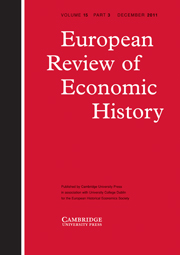Crossref Citations
This article has been cited by the following publications. This list is generated based on data provided by
Crossref.
Nogal, Carlos Álvarez
2005.
El transporte de moneda en la España del siglo XVII: mecanismos y costes.
Revista de Historia Económica / Journal of Iberian and Latin American Economic History,
Vol. 23,
Issue. S1,
p.
379.
Giráldez, Arturo
2005.
La economía global yEl Quijote.
Revista de Historia Económica / Journal of Iberian and Latin American Economic History,
Vol. 23,
Issue. S1,
p.
101.
Bryan Souza, George
2006.
Early Global Encounters with Beauty: The Pacific and Indo-Atlantic Exchanges between Asia and America.
Review: Literature and Arts of the Americas,
Vol. 39,
Issue. 1,
p.
13.
Sachsenmaier, Dominic
2006.
Global history and critiques of western perspectives.
Comparative Education,
Vol. 42,
Issue. 3,
p.
451.
BROADBERRY, STEPHEN
and
GUPTA, BISHNUPRIYA
2006.
The early modern great divergence: wages, prices and economic development in Europe and Asia, 1500–18001.
The Economic History Review,
Vol. 59,
Issue. 1,
p.
2.
Flynn, Dennis O.
and
Giráldez , Arturo
2008.
BORN AGAIN: GLOBALIZATION'S SIXTEENTH CENTURY ORIGINS (ASIAN/GLOBAL VERUS EUROPEAN DYNAMICS).
Pacific Economic Review,
Vol. 13,
Issue. 3,
p.
359.
Ronnback, K.
2009.
Integration of global commodity markets in the early modern era.
European Review of Economic History,
Vol. 13,
Issue. 1,
p.
95.
Reeves, Keir
Frost, Lionel
and
Fahey, Charles
2010.
INTEGRATING THE HISTORIOGRAPHY OF THE NINETEENTH‐CENTURY GOLD RUSHES.
Australian Economic History Review,
Vol. 50,
Issue. 2,
p.
111.
Lucassen, Leo
2010.
Mapping Contemporary History II.
p.
123.
DE VRIES, JAN
2010.
The limits of globalization in the early modern world.
The Economic History Review,
Vol. 63,
Issue. 3,
p.
710.
Boomgaard, Peter
and
Hart, Marjolein 't
2010.
Globalization, Environmental Change, and Social History: An Introduction.
International Review of Social History,
Vol. 55,
Issue. S18,
p.
1.
Vries, Peer
2010.
The California School and Beyond: How to Study the Great Divergence?.
History Compass,
Vol. 8,
Issue. 7,
p.
730.
White, Sam
2011.
From Globalized Pig Breeds to Capitalist Pigs: A Study in Animal Cultures and Evolutionary History.
Environmental History,
Vol. 16,
Issue. 1,
p.
94.
DOBADO-GONZÁLEZ, RAFAEL
GARCÍA-HIERNAUX, ALFREDO
and
GUERRERO, DAVID E.
2012.
The Integration of Grain Markets in the Eighteenth Century: Early Rise of Globalization in the West.
The Journal of Economic History,
Vol. 72,
Issue. 3,
p.
671.
Ronnback, K.
2012.
The speed of ships and shipping productivity in the age of sail.
European Review of Economic History,
Vol. 16,
Issue. 4,
p.
469.
Flynn, Dennis O.
and
Lee, Marie A.
2013.
East Asian Trade before/after 1590s Occupation of Korea: Modeling Imports and Exports in Global Context.
The Asian review of World Histories,
Vol. 1,
Issue. 1,
p.
117.
Dobado Gonzáles, Rafael
García-Hiernaux, Alfredo
and
Guerrero, David E.
2013.
West versus East: Early Globalization and the Great Divergence.
SSRN Electronic Journal,
Scholes, RJ
Reyers, B
Biggs, R
Spierenburg, MJ
and
Duriappah, A
2013.
Multi-scale and cross-scale assessments of social–ecological systems and their ecosystem services.
Current Opinion in Environmental Sustainability,
Vol. 5,
Issue. 1,
p.
16.
GASCH-TOMÁS, JOSÉ L.
2014.
GLOBALISATION, MARKET FORMATION AND COMMODITISATION IN THE SPANISH EMPIRE. CONSUMER DEMAND FOR ASIAN GOODS IN MEXICO CITY AND SEVILLE, C. 1571-1630.
Revista de Historia Económica / Journal of Iberian and Latin American Economic History,
Vol. 32,
Issue. 2,
p.
189.
Meissner, Christopher M.
2014.
Vol. 2,
Issue. ,
p.
1033.




